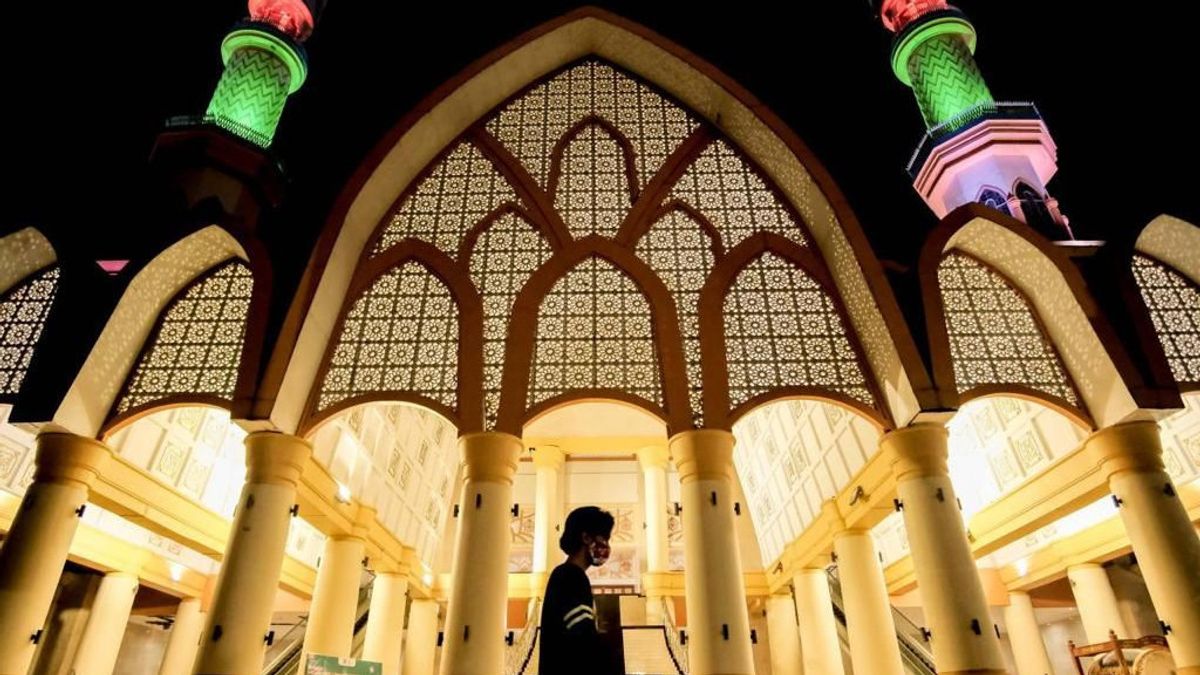JAKARTA - Canon, a dog in Aceh Singkil Regency, died after being arrested by Satpol PP. Is it true that halal tourism is the pretext for Canon's arrest? What exactly is the concept of halal tourism? Isn't halal tourism more inclined to a business gimmick approach than the enforcement of sharia? Even if he enforces the Shari'a, still no dog should die, right? Halal tourism should be a blessing. Not a disaster, even if it was a dog that was hit.
Canon is a pet male dog at one of the resorts at the Pulau Panjang tourist attraction, Pulau Baguk Village, Pulau Banyak District, Aceh Singkil Regency, Aceh. Tuesday, October 19, Canon faced the siege of members of the Satpol PP.
One of the civil servants directed the fork to deal with the Canon. The Canon was then put in a basket and taken away. Long story short Canon died in the process of moving it.
The transfer of Canon is said to have been carried out because of the implementation of halal tourism in the Banyak Island area. Head of Satpol PP Aceh Singkil and Wilayatuh Hisbah Aceh Singkil Ahmad Yani denied the pretext of halal tourism as the reason for Canon's transfer. He said it was done at the request of the District Muspika because two people had been bitten by Canon.
"We caught the dog not because of a halal tourism icon, we did it at the request of the Muspika because the presence of a dog (Canon) on the island disturbed the comfort of visitors," said Ahmad Yani, quoted by AcehKini.

Outside the context of Canon, it is clear that since 2019 the Aceh Singkil government has indeed banned the presence of dogs in halal tourist sites. Looking at the legal context, the dog ban is based on a rule issued November 5, 2019.
The regulation was issued through a letter numbered 5564/10 addressed to tourism and restaurant managers. The letter contains four prohibitions:
It is forbidden to keep dogs and pigs at tourist sites. It is forbidden to sell and serve liquor. Not to employ commercial sex workers, prostitution or to allow lewd things that can violate eastern ethics. Not to apply things that are contrary to local wisdom.Letter 5564/10 also mentions that the basis for the regulation refers to the Aceh Governor's Letter Number 556/2266 dated February 12, 2019 regarding the implementation of halal tourism in Aceh. The sub-district head of Pulau Banyak Mukhlis, who co-signed the letter, stated that he had warned tourism managers, including Canon owners, about enforcing dog-keeping rules.
"We have written letters since 2019. The village head has also warned not to keep dogs. But the resort owner who keeps animals at the tourist sites has not heeded," said Mukhlis, quoted by Antara.
Halal tourism as a business gimmick
What exactly is halal tourism? This is important to discuss because many views mistakenly consider halal tourism as the Islamization of the world of tourism. The concern was expressed by Vice President Ma'ruf Amin when many regions expressed objections to halal tourism.
"Of course we want to eliminate the wrong perception about halal tourism or sharia tourism. There seems to be an impression that sharia tourism will be prescribed. Then, the regions objected," said Maruf in an official statement, last May.
Quoted from the Kemenparekraf/Baparekraf Halal Tourism Implementation Guide, Halal tourism refers to additional amenities, attractions, and accessibility services that are intended and provided to meet the experiences, needs, and desires of Muslim tourists. In other words, halal tourism is a business gimmick to target specific market clusters of the Muslim population.
The concept of halal tourism does not mean changing tourist attractions, but focuses on services, for example ensuring there is a Qibla direction guide, places of prayer to the provision of halal food and drinks. Halal tourism is also related to the commitment of tourism managers to a certain level of health, both in terms of food and the environment.
If you look at the roots of its emergence, halal tourism is adopted from non-OIC (Organization of Islamic Cooperation) countries. Leading countries, such as Japan, Australia, Korea, New Zealand, the UK to France see great potential for Muslim growth globally.

Halal tourism was then created as a forum that accommodates the needs - especially regarding worship and matters concerning religious beliefs - Muslim tourists. Halal tourism also does not mean limiting non-Muslim tourists to their habits while traveling.
Quoted from Republika, the General Chair of the Halal Tourism Association (PPHI) Riyanto Sofyan agreed with Maruf's statement. He said it was not appropriate to associate halal tourism with Islamization or Arabization. Apart from being racist, this assumption is basically wrong. Halal tourism is an international brand that targets global needs. The end is for the sake of foreign exchange.
As explained above, halal tourism is actually promoted by non-Muslim majority countries to bring Muslim tourists from all over the world to their countries. It's simply like branding vegetarian tourism for tourists from India.
"So this is a kind of extended services and facilities for Muslim travelers," said Riyanto.
Halal tourism economic potentialIt is not without reason that halal tourism is developing, both in terms of interest and implementation. Halal tourism is a promising market. The Mastercard Crescentrating Global Travel Market Index (GTMI) 2019 report predicts the number of Muslim tourists globally at 230 million.
That figure is an increase from 2018, where there were only 140 million Muslim tourists. in harmony. The Global Islamic Economy Report predicts that the turnover of world halal tourism will increase, from US$177 billion in 2017 to US$274 billion in 2023.
Indonesia has great potential to become one of the main players in halal tourism. A number of awards in the realm of world halal tourist destinations have been recorded. In 2019, for example. The Global Muslim Travel Index (GMTI) has named Indonesia as the best halal tourist destination in the world. Indonesia excels above 130 other participating countries.
The coronation is based on GMTI records that 20 percent or around 14.92 million foreign tourists who come to Indonesia are Muslim tourists. Other indicators are environmental aspects, services, communication, and access to halal tourist destinations spread throughout the country.

Besides the GMTI coronation, another achievement was Indonesia's victory over 12 of the 16 2016 World Halal Tourism Awards in Abu Dhabi. Minister of Tourism and Creative Economy/Head of the Tourism and Creative Economy Agency (Menparekraf) Sandiaga Uno said these achievements made him very optimistic about the success of Indonesia's halal tourism.
Not to mention the demographic capital, where the majority of Indonesia's population is Muslim. Indonesia is even listed as the country with the largest Muslim population in the world. The Indonesian Muslim population is expected to be a skilled halal tourism driver in developing destinations.
"In addition to having the largest Muslim population in the world, Indonesia also has various tourist destinations for the development of halal tourism potential," said Sandiaga at the Launching of Spiritual International Halal Science Conference 2021: Enhancing and Strengthening Halal Industry through Science, Tuesday, July 13. .
*Read other information about TOURISM or read other interesting articles from Yudhistira Mahabharata.
Other BERNASThe English, Chinese, Japanese, Arabic, and French versions are automatically generated by the AI. So there may still be inaccuracies in translating, please always see Indonesian as our main language. (system supported by DigitalSiber.id)









